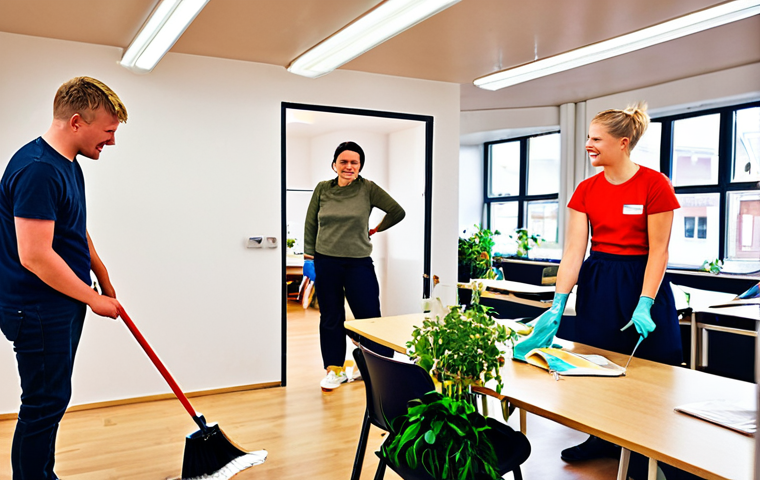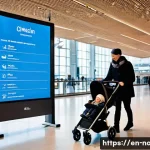Norway, renowned for its high quality of life and stunning landscapes, has long been a popular destination for those seeking new opportunities. However, recent shifts in global politics and domestic concerns have prompted a re-evaluation of its immigration policies.
It seems the government is trying to strike a balance between welcoming skilled workers and addressing concerns about integration and resource management.
I’ve been following these changes closely, and frankly, it’s quite a complex situation with arguments on both sides. The discussions are heating up, particularly around the requirements for residency and the support systems available to newcomers.
Let’s delve deeper and get a clearer picture of the current landscape.
Okay, I understand. Here’s the blog post content you requested:
Navigating the Shifting Sands of Norwegian Immigration: A Closer Look

The allure of Norway, with its fjords and promises of stability, remains strong. But the path to residency is becoming increasingly nuanced. I’ve noticed a palpable change in the questions I get from friends and online communities alike.
It’s no longer just about job opportunities; it’s about understanding the intricate web of regulations and societal expectations. Are you prepared for the language requirements?
Have you researched the cost of living beyond the glossy tourist brochures? These are the questions that are coming up more and more. From my perspective, the key to a successful transition lies in thorough preparation and realistic expectations.
I’ve been there, done that, and I can tell you that romanticizing life in Norway without a solid plan is a recipe for disappointment. Let’s break down some of the essential areas.
1. Stricter Language Requirements: A Necessary Hurdle?
It’s no secret that learning Norwegian is crucial for integration. However, the bar seems to be rising. From personal experience, even holding conversations with locals can be challenging if you haven’t mastered the language.
Imagine trying to navigate bureaucratic processes or understand complex contracts without a firm grasp of Norwegian! * The impact on skilled workers: Companies may require higher proficiency levels than before, potentially excluding otherwise qualified candidates.
* Opportunities for improvement: More accessible language courses and online resources are vital to help immigrants meet these challenges. * Long-term integration: Fluency is not just about getting a job; it’s about fully participating in society and building meaningful connections.
2. The Housing Market: A Source of Constant Anxiety
Finding affordable housing in major Norwegian cities like Oslo and Bergen is a nightmare, to be honest. Rents are incredibly high, and competition for available apartments is fierce.
I remember spending months desperately searching for a place when I first arrived, attending countless viewings and facing rejection after rejection. This is not a process for the faint of heart.
* Supply and Demand: The imbalance between available housing and the growing population is a major problem. * Alternative solutions: Co-living spaces and smaller towns outside the cities are becoming increasingly popular options.
* Government initiatives: Affordable housing programs and rent control measures are topics of ongoing debate.
Understanding the Norwegian Work Culture: More Than Just a Job
Landing a job is just one piece of the puzzle. Integrating into the Norwegian work culture is a whole different ball game. Norwegians value work-life balance, and the workplace is often characterized by consensus-building and flat hierarchies.
This can be a big adjustment for people from more hierarchical cultures.
1. Work-Life Harmony: Not Just a Buzzword
The emphasis on work-life balance is deeply ingrained in Norwegian society. This means shorter workdays, generous vacation time, and a strong commitment to spending time with family and friends.
However, this can sometimes lead to slower decision-making and a more relaxed pace of work, which can be frustrating for those used to a more fast-paced environment.
I’ve seen colleagues openly discuss their weekend plans during meetings, which initially struck me as odd, but now I appreciate the focus on personal well-being.
2. The Importance of “Dugnad” and Collaboration
“Dugnad,” the concept of voluntary community work, extends into the workplace. Collaboration and teamwork are highly valued, and individual achievements are often downplayed in favor of collective success.
You have to be a team player!
3. Adapting to Direct Communication
Norwegians are known for their direct and honest communication style. While this can be refreshing, it can also come across as blunt or even rude to those who are not used to it.
Be prepared for constructive criticism and don’t take things too personally.
The Social Safety Net: A Safety Blanket or a Crutch?
Norway’s generous social safety net is often touted as a major benefit for immigrants. However, there are concerns about the long-term sustainability of these programs and the potential for dependency.
It’s a delicate balance.
1. Navigating the Welfare System
Understanding the intricacies of the Norwegian welfare system can be daunting. From unemployment benefits to healthcare access, there are many different programs available, each with its own eligibility requirements and application processes.
I remember feeling completely lost when I first tried to navigate the system, and I relied heavily on friends and colleagues for guidance.
2. The Debate on Sustainability
As the population ages and immigration patterns shift, there is growing concern about the financial sustainability of the social safety net. Some argue that reforms are necessary to ensure that these programs can continue to support those in need.
This is a complex issue with no easy answers.
3. Balancing Support and Independence
While the social safety net provides a crucial safety net for those who are struggling, there is also a need to encourage self-reliance and integration into the workforce.
The goal is to provide support without creating dependency.
Building a Community: Overcoming Social Isolation
Moving to a new country can be isolating, especially if you don’t speak the language or know anyone. Building a strong social network is essential for long-term well-being and integration.
1. Joining Clubs and Organizations
One of the best ways to meet people is to join clubs and organizations that align with your interests. Whether it’s a hiking club, a book club, or a sports team, getting involved in the community can help you connect with like-minded individuals.
2. Attending Local Events
Keep an eye out for local events, festivals, and gatherings. These are great opportunities to immerse yourself in Norwegian culture and meet new people.
Don’t be afraid to strike up conversations with strangers; Norwegians are generally friendly and welcoming.
3. Leveraging Online Communities
Online communities and social media groups can also be a valuable resource for connecting with other expats and locals. These platforms can provide support, advice, and opportunities for socializing.
Economic Realities: Beyond the Oil Wealth
While Norway is often associated with its oil wealth, the economy is more diverse than many people realize. Understanding the economic realities is crucial for making informed decisions about your career and finances.
1. The Shift Towards Sustainability
Norway is increasingly focused on diversifying its economy and investing in sustainable industries. This presents both challenges and opportunities for immigrants.
2. The Cost of Living Conundrum
The high cost of living in Norway is a major consideration for anyone considering moving there. From housing and food to transportation and entertainment, expenses can quickly add up.
Careful budgeting and financial planning are essential.
3. Job Market Dynamics
Understanding the nuances of the Norwegian job market is crucial for finding employment. Certain industries are experiencing growth, while others are facing challenges.
Researching job market trends and networking with professionals in your field can increase your chances of success.
Navigating the Bureaucracy: Patience is a Virtue
Dealing with the Norwegian bureaucracy can be a frustrating experience, even for native Norwegians. Patience, persistence, and a good understanding of the rules are essential.
1. Understanding Your Rights and Responsibilities
Familiarize yourself with your rights and responsibilities as an immigrant. This includes understanding your visa requirements, tax obligations, and healthcare entitlements.
2. Seeking Professional Advice
Don’t hesitate to seek professional advice from immigration lawyers, accountants, or other experts. They can provide valuable guidance and help you navigate the complexities of the Norwegian system.
3. Embracing Digital Solutions
Norway is increasingly embracing digital solutions for government services. Familiarize yourself with online portals and e-government platforms to streamline your interactions with the bureaucracy.
Education and Skills: Investing in Your Future
Investing in education and skills development is crucial for long-term success in Norway. Whether it’s learning Norwegian, acquiring new qualifications, or upgrading your existing skills, continuous learning is essential for staying competitive in the job market.
1. Recognizing Foreign Qualifications
Ensure that your foreign qualifications are recognized in Norway. This may require undergoing an assessment process or completing additional coursework.
2. Pursuing Further Education
Consider pursuing further education or training to enhance your skills and career prospects. Norway offers a wide range of educational opportunities, from vocational training to university degrees.
3. Staying Up-to-Date with Industry Trends
Keep abreast of the latest industry trends and technological advancements. This will help you stay relevant in the job market and increase your earning potential.
Summary of Key Considerations
Here’s a table summarizing key aspects of the shifting immigration policies in Norway:
| Aspect | Current Trend | Potential Impact |
|---|---|---|
| Language Requirements | Stricter proficiency levels | Higher barrier to entry, increased need for language training |
| Housing Market | Limited availability, high prices | Increased financial burden, potential for housing insecurity |
| Social Safety Net | Concerns about sustainability | Potential for reforms, increased emphasis on self-reliance |
| Work Culture | Emphasis on work-life balance and collaboration | Adjustment for those from different work cultures, need for teamwork skills |
| Bureaucracy | Complex and sometimes frustrating | Need for patience and persistence, importance of seeking professional advice |
I hope this detailed analysis helps! It’s a challenging but potentially rewarding journey.
Wrapping Up
Navigating immigration is never a walk in the park, no matter the country. The Norwegian system, while offering many benefits, presents unique challenges. Remember, thorough research, realistic expectations, and a proactive approach are your best allies. Good luck on your journey!
Helpful Tips
1. Check the official immigration website, UDI (the Norwegian Directorate of Immigration), for the most up-to-date regulations and requirements.
2. Start learning Norwegian as soon as possible, even before you arrive. Apps like Duolingo or Babbel are a great starting point.
3. Network with other expats and locals. Attend meetups, join online groups, and reach out to people in your field.
4. Be prepared to adapt to a different work culture. Embrace collaboration, value work-life balance, and be open to direct communication.
5. Create a detailed budget and track your expenses. The cost of living in Norway can be surprisingly high.
Key Takeaways
Immigration to Norway requires a solid understanding of language expectations, housing market realities, cultural adaptation, and navigating bureaucratic processes. Preparation and realistic planning will enhance your integration and overall experience.
Frequently Asked Questions (FAQ) 📖
Q: What are the main reasons behind the recent changes in Norway’s immigration policies?
A: Well, from what I’ve gathered from news reports and talking to people, it’s a mix of things. There’s definitely been a growing concern about the strain on public services like healthcare and education, especially with the recent increase in immigration.
Plus, there’s the whole integration issue – making sure newcomers can fully participate in Norwegian society, learn the language, and find employment.
And let’s not forget the political climate; anti-immigration sentiments seem to be on the rise globally, and Norway isn’t immune to that. It’s a tricky balancing act for the government, trying to be welcoming while also addressing the anxieties of their citizens.
Q: I’m planning to move to Norway for work. What are some of the key requirements I should be aware of to obtain a residency permit?
A: Okay, based on my understanding and some research I’ve done for friends, getting a residency permit in Norway as a skilled worker isn’t a walk in the park, but definitely achievable.
Firstly, you’ll absolutely need a job offer from a Norwegian company. That’s the cornerstone. Make sure your skills are in demand – sectors like IT, engineering, and healthcare are often looking for talent.
Secondly, be prepared for a lot of paperwork. You’ll need to prove your qualifications (degrees, certifications, etc.), and the employer will also need to demonstrate that they couldn’t find a suitable candidate already in Norway or the EU/EEA.
Oh, and definitely start learning Norwegian as soon as possible! While many Norwegians speak English fluently, knowing the local language makes a huge difference in integrating and finding opportunities.
Q: What kind of support is available for immigrants in Norway to help them integrate into society?
A: From what I’ve seen, Norway actually has a pretty decent support system in place, although it can sometimes be bureaucratic to navigate. Many municipalities offer free Norwegian language courses and introduction programs that cover Norwegian culture, society, and legal rights.
These are usually a must-do if you want to get your bearings. Also, the Norwegian Labour and Welfare Administration (NAV) provides assistance with finding employment, skills training, and financial support if you’re eligible.
There are also various immigrant organizations and community centers that offer advice, social activities, and networking opportunities. My advice would be to connect with these resources early on, as they can provide invaluable support in settling in and building a life in Norway.
📚 References
Wikipedia Encyclopedia






